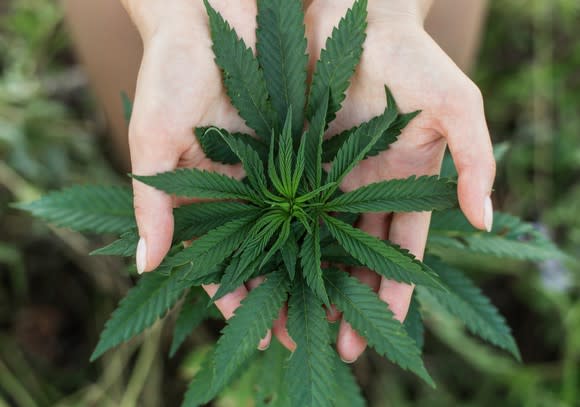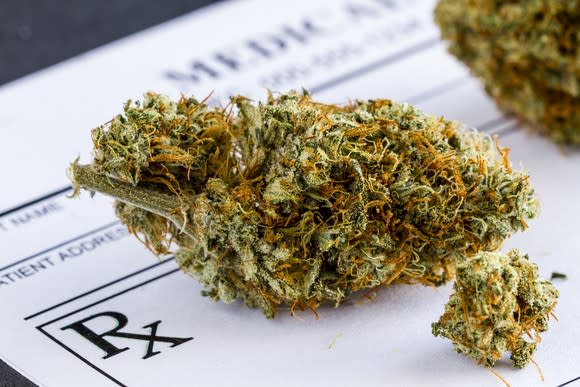Opinion: Rescheduling Marijuana Would Make Things Even Worse Than They Are Now
It's truly amazing how quickly the marijuana industry has blossomed in recent years. In 1995, not a single state in the U.S. had approved cannabis use for medicinal purposes, and national pollster Gallup found that only 25% of the public favored the idea of legalizing pot nationally. Mind you, this low support came after a long anti-drug campaign in our nation's schools that cautioned children to stay away from all Schedule I narcotics, of which marijuana is included.
The legal weed industry is budding before our eyes
However, flash-forward to today, and the landscape looks very different. In total, 29 states have legalized cannabis for medical use, with a small handful – Pennsylvania, Ohio, and West Virginia – legalizing medical weed entirely through the legislative process. An additional nine states have legalized recreational cannabis, including Vermont, which recently became the first to do so in its legislature. According to Marijuana Business Daily's report, "Marijuana Business Factbook 2017," U.S. legal pot sales could hit $17 billion by 2021, representing a quadrupling in just a five-year period.

Image source: Getty Images.
Meanwhile, support for legalizing cannabis has soared. Gallup's nearly five-decade-long survey showed that 64% of respondents favored legalization this past October. A separate poll in August from the independent Quinnipiac University found 94% support for legalizing medical marijuana, compared to a minuscule 4% who opposed the idea.
We can even see these changes manifesting in society and our politicians. What had once been a taboo issue that lawmakers wouldn't touch with a 10-foot pole and families didn't discuss is now a regular campaign issue and something that may even be discussed at the dinner table.
Marijuana's Schedule I classification is a major drag
Yet, for as far as legal cannabis has come in the U.S., it's still got a long way to go. You see, marijuana is still classified as a Schedule I substance, meaning it's wholly illegal, prone to abuse, and has no recognized medical benefits. LSD, heroin, and cocaine all sit right beside marijuana as Schedule I drugs. It essentially means that while the federal government has taken a hands-off approach, these 29 legalizing states are acting in violation of federal law, should the Drug Enforcement Agency or Justice Department want to strictly enforce the Controlled Substances Act (CSA).
It also means that marijuana businesses and patients face serious obstacles. For instance, medical research is stymied by red tape, as well as the fact that just a single approved grow facility exists in the U.S. at the University of Mississippi. Lawmakers want thorough benefit-versus-risk analyses before they'd consider rescheduling or de-scheduling marijuana, but those studies are practically impossible to run given its current scheduling.

Image source: Getty Images.
As for businesses, they face two major financial constraints. First, most lack the ability to access basic banking services. That means no lines of credit, no loans, and no access to a checking account. Since financial institutions answer to the Federal Deposit Insurance Corporation (FDIC), and the FDIC is a federally created entity, a strict interpretation of the CSA would suggest that banks aiding marijuana businesses in any way could be construed as laundering money. That would be a fineable and/or criminal offense.
Pot companies are also hammered by U.S. tax code 280E, which disallows businesses that sell a federally illegal substance from deducting otherwise normal business expenses. Should a marijuana company beat the odds and turn a profit in the U.S., it'll likely pay an effective tax rate of up to 70% to 90%. That leaves little capital left over for reinvestment and hiring.
Rescheduling cannabis to Schedule II could actually make things worse
Legalization enthusiasts have been regularly fighting for marijuana's de-scheduling or rescheduling, which would presumably make life easier for medical patients, consumers, and businesses. Unfortunately, if cannabis were rescheduled at some point in the future, it'd likely be moved to Schedule II, which could actually make things far worse than they are now.
On the bright side, anything other than a Schedule I classification would recognize cannabis as having medical benefits. This is, in itself, not too far of a reach. For instance, GW Pharmaceuticals (NASDAQ: GWPH) appears to be on the verge of becoming the very first drug developer to get a cannabinoid-based drug approved by the Food and Drug Administration (FDA). Currently under review by the FDA, GW Pharmaceuticals' experimental cannabidiol-based drug Epidiolex met its primary endpoint of a statistically significant reduction in seizure frequency relative to baseline and compared to a placebo in multiple pivotal-stage trials for two types of childhood-onset epilepsy – Dravet syndrome and Lennox-Gastaut syndrome. For GW Pharmaceuticals, approval would be a major victory, and it'd also likely make the company profitable within a few years.

Image source: Getty Images.
But a move to Schedule II wouldn't alleviate a lot of the problems cannabis companies or patients are currently facing. Tax code 280E, for example, would still apply to Schedule II substances, meaning pot businesses could still face exorbitantly high effective tax rates, impeding their ability to expand, innovate, and hire.
The even bigger issue is that Schedule II substances would come under the direct control of the FDA. The FDA has the final say on packaging and marketing materials, and would likely maintain very tight oversight of growing operations. In particular, the FDA would test for tetrahydrocannabinol (THC) consistency from batch to batch. THC is the psychoactive component of cannabis.
Now here's the real concern: the FDA would also have the power (should it choose) to require that cannabis demonstrate, in clinical trials designed or authorized by the FDA, its ability to improve medical conditions. As an example, if a handful of states claim that medical marijuana helps to alleviate cancer pain, then the FDA, under a Schedule II scenario, could require that clinical trials be run to prove that cannabis alleviates cancer pain. These trials could be quite costly and time-consuming, and it has the potential to cut medical patients off from a drug that many are able to use in 29 states right now with minimal to no interference from the federal government as a Schedule I drug.
This creates quite the dilemma for legalization enthusiasts. Clearly, if marijuana were de-scheduled, none of this would be an issue. But it's very unlikely for a drug to move from the most stringent classification to completely off the list in one fell swoop. If cannabis is to be reclassified at some point in the future, Schedule II is the most likely outcome. That might mean a no-win situation for U.S.-based marijuana companies and patients anytime soon.
More From The Motley Fool
Sean Williams has no position in any of the stocks mentioned. The Motley Fool has no position in any of the stocks mentioned. The Motley Fool has a disclosure policy.

 Yahoo Finance
Yahoo Finance 